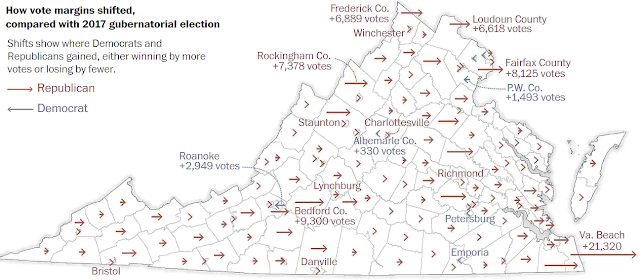 |
| Red shift: Chart of Virginia counties and independent cities' vote by The Washington Post; click on it to enlarge. |
Rural voters' voices were plainly heard in statewide elections Tuesday in Virginia and New Jersey.
"Rural America roars again," read a subhead on a Politico story that gave rural voters' strong turnout part of the credit for Republican Glenn Youngkin's 2.5-percentage-point defeat of former Gov. Terry McAuliffe in the governor's race. "In counties throughout rural Virginia, Youngkin ran even with or, often, ahead" of Donald Trump's performance last year, Steven Shepard and David Siders report.
The standout example of that was Bedford County, between Roanoke and Lynchburg, where Youngkin got 79 percent of the vote, 6 points better than Trump. "Moreover, turnout in many of these counties easily surpassed the last governor’s race four years ago, a sign that Trump’s base was motivated to turn out without Trump on the ticket himself, or even an in-person Trump rally," Politico reports. "The other side of that coin: Democratic candidates continue to sink to new lows in rural areas, especially among white voters. According to exit polls, Youngkin won white voters without a college degree — who are overrepresented in rural areas — by a 3-to-1 margin, 76 percent to 24 percent." Trump's 2020 edge among them was 62-38..
Anecdotal evidence showed voters punished McAuliffe for saying "I don't think parents should be telling schools what they should teach," but the result -- and New Jersey Gov. Phil Murphy's narrow escape in a race that wasn't rated as close -- sparked analysis and recriminations.
"I don't think Democrats are comfortable campaigning in rural America, and they don't go, and it becomes self-fulfilling," NBC News Political Director Chuck Todd told House Democratic Whip James Clyburn on "MTP Daily."
Clyburn told Todd that the key for Democrats to regain rural traction is to do something for them, such as the $65 billion for broadband in the House spending bill: "If people knew they had this coming, and felt comfortable with it, we would have a better message to deliver in rural America."
Rural Voices USA, a network that says it is "working to advocate, communicate, and hold policy makers accountable for rural issues," said likewise: “The disconnect between rural America and Washington, D.C. only continues to widen. The divide is evident in one-sided election results in rural counites that are increasingly frustrated they are not being heard and that lawmakers are not delivering on their priorities. . . . After passing those key pieces of legislation, lawmakers must get out into rural communities and actually talk about what those bills do. We need meaningful engagement on how universal preschool will create opportunities for rural parents and kids, how construction projects will create good jobs locally, how broadband will expand in their communities and more. The only way smart rural policy beats cynicism about government and far-right-wing talking points is if rural folks can feel and see it in their everyday lives.”
But longtime political analyst Jeff Greenfield wrote for Politico that Youngkin won on the school issue, and the "real lesson for Republicans on Tuesday" is that "One of their most powerful political assets is alive and well: the power of cultural issues over policies."
In a similar vein, Clyburn also said his party is perceived as too cosmopolitan, and Democratic strategist James Carville said that much more strongly on PBS NewsHour. He said Youngkin never mentioned Biden, and voters are reacting to "left-wing nonsense" by "woke" progressives. "What went wrong is this stupid wokeness," Carville said. "Some of these people need to go to a woke detox center or something. . . . They're suppressing our vote."
Former U.S. Rep. Barbara Comstock, a Virginia Republican, agreed, saying rural and suburban women liked the optimistic Youngkin better than Trump, "the surly sore loser who hopefully is in the rear-view mirror now." She might be accused of wishful thinking.
No comments:
Post a Comment